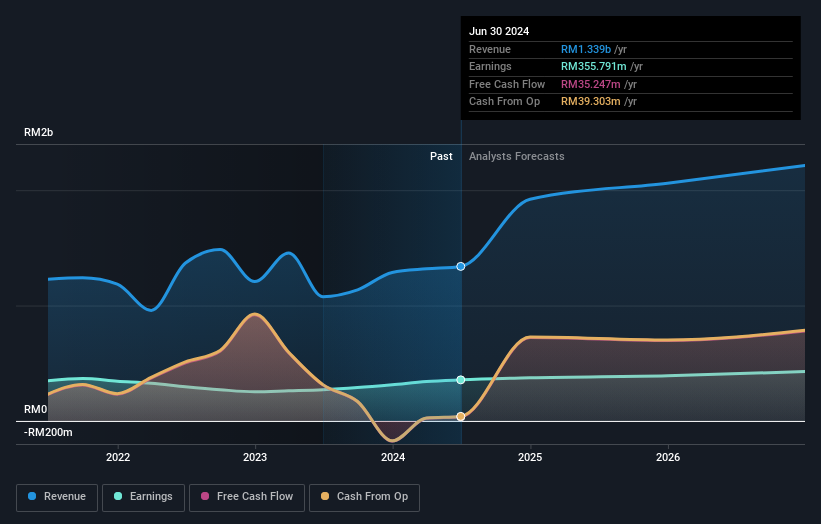LPI Capital Bhd (KLSE:LPI) surges 4.4%; private companies who own 46% shares profited along with institutions

Key Insights
- Significant control over LPI Capital Bhd by private companies implies that the general public has more power to influence management and governance-related decisions
- The top 2 shareholders own 52% of the company
- Institutions own 28% of LPI Capital Bhd
Every investor in LPI Capital Bhd (KLSE:LPI) should be aware of the most powerful shareholder groups. The group holding the most number of shares in the company, around 46% to be precise, is private companies. In other words, the group stands to gain the most (or lose the most) from their investment into the company.
Following a 4.4% increase in the stock price last week, private companies profited the most, but institutions who own 28% stock also stood to gain from the increase.
In the chart below, we zoom in on the different ownership groups of LPI Capital Bhd.
Check out our latest analysis for LPI Capital Bhd

What Does The Institutional Ownership Tell Us About LPI Capital Bhd?
Many institutions measure their performance against an index that approximates the local market. So they usually pay more attention to companies that are included in major indices.
We can see that LPI Capital Bhd does have institutional investors; and they hold a good portion of the company's stock. This implies the analysts working for those institutions have looked at the stock and they like it. But just like anyone else, they could be wrong. When multiple institutions own a stock, there's always a risk that they are in a 'crowded trade'. When such a trade goes wrong, multiple parties may compete to sell stock fast. This risk is higher in a company without a history of growth. You can see LPI Capital Bhd's historic earnings and revenue below, but keep in mind there's always more to the story.

Hedge funds don't have many shares in LPI Capital Bhd. The company's largest shareholder is Consolidated Teh Holdings Sdn Berhad, with ownership of 43%. In comparison, the second and third largest shareholders hold about 9.4% and 8.5% of the stock.
After doing some more digging, we found that the top 2 shareholders collectively control more than half of the company's shares, implying that they have considerable power to influence the company's decisions.
While studying institutional ownership for a company can add value to your research, it is also a good practice to research analyst recommendations to get a deeper understand of a stock's expected performance. There are a reasonable number of analysts covering the stock, so it might be useful to find out their aggregate view on the future.
Insider Ownership Of LPI Capital Bhd
The definition of company insiders can be subjective and does vary between jurisdictions. Our data reflects individual insiders, capturing board members at the very least. Management ultimately answers to the board. However, it is not uncommon for managers to be executive board members, especially if they are a founder or the CEO.
I generally consider insider ownership to be a good thing. However, on some occasions it makes it more difficult for other shareholders to hold the board accountable for decisions.
We can see that insiders own shares in LPI Capital Bhd. It is a pretty big company, so it is generally a positive to see some potentially meaningful alignment. In this case, they own around RM207m worth of shares (at current prices). It is good to see this level of investment by insiders. You can check here to see if those insiders have been buying recently.
General Public Ownership
With a 22% ownership, the general public, mostly comprising of individual investors, have some degree of sway over LPI Capital Bhd. While this group can't necessarily call the shots, it can certainly have a real influence on how the company is run.
Private Company Ownership
We can see that Private Companies own 46%, of the shares on issue. It might be worth looking deeper into this. If related parties, such as insiders, have an interest in one of these private companies, that should be disclosed in the annual report. Private companies may also have a strategic interest in the company.
Next Steps:
It's always worth thinking about the different groups who own shares in a company. But to understand LPI Capital Bhd better, we need to consider many other factors. Be aware that LPI Capital Bhd is showing 2 warning signs in our investment analysis , and 1 of those is potentially serious...
If you are like me, you may want to think about whether this company will grow or shrink. Luckily, you can check this free report showing analyst forecasts for its future.
NB: Figures in this article are calculated using data from the last twelve months, which refer to the 12-month period ending on the last date of the month the financial statement is dated. This may not be consistent with full year annual report figures.
New: AI Stock Screener & Alerts
Our new AI Stock Screener scans the market every day to uncover opportunities.
• Dividend Powerhouses (3%+ Yield)
• Undervalued Small Caps with Insider Buying
• High growth Tech and AI Companies
Or build your own from over 50 metrics.
Have feedback on this article? Concerned about the content? Get in touch with us directly. Alternatively, email editorial-team (at) simplywallst.com.
This article by Simply Wall St is general in nature. We provide commentary based on historical data and analyst forecasts only using an unbiased methodology and our articles are not intended to be financial advice. It does not constitute a recommendation to buy or sell any stock, and does not take account of your objectives, or your financial situation. We aim to bring you long-term focused analysis driven by fundamental data. Note that our analysis may not factor in the latest price-sensitive company announcements or qualitative material. Simply Wall St has no position in any stocks mentioned.
About KLSE:LPI
LPI Capital Bhd
An investment holding company, engages in the underwriting of general insurance products for personal and business needs in Malaysia, Singapore, and Cambodia.
Flawless balance sheet average dividend payer.
Market Insights
Community Narratives



